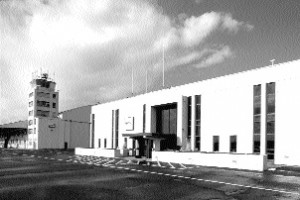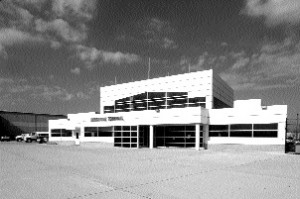By W. Stephen Dennis
For more than 50 years, the name Atlantic Aviation has been recognized as a hallmark of business aviation. Founded by the du Pont family in Wilmington, Del., in the 1930s, Atlantic has been pivotal in the development of many of the innovations in customer service introduced into corporate aviation over the years.
Other than the founders of Atlantic, there is no other person who has become more recognized as “Mr. Atlantic” than the inimitable Hank Esposito. From his office at Atlantic Teterboro, overlooking the classic skyline of mid-town Manhattan, Hank was recognized as the man whom many would say personified the philosophy of customer service that Atlantic still stands for today.
Teterboro was added as the second location of Atlantic, and it emerged, along with Paul Butler’s Butler Aviation, in the development of one of the first two FBO networks.
As Teterboro continued to increase in popularity as the “preferred” destination airport to access New York City, Hank, too, began to anticipate the changes that would be necessary to provide superior service to his customers. He was considered by many to have been the man who first introduced some of the first customer service innovations into the “personalized” care of passengers and crews. His motto was, “The customer is ‘always’ right—even when he is wrong!”
I recall legendary stories about Hank going to the nth degree to assist Atlantic customers. On one occasion—I think it was the second time “the lights went out” in New York City in the mid-seventies (just across the Hudson from Teterboro Airport)—Hank took Harry Combs and a group of us from Gates Learjet to his home for dinner the night of the power failure, because it was impossible to find anywhere to eat during that chaos.
During the major storms that plagued the metropolitan area over the years, it was not uncommon for Hank to bunk flight crews in his offices at Teterboro, or take his customers or passengers all the way home when it was impossible to get a limo.
The Esprit de Corps and personal commitment that Hank Esposito pioneered at Atlantic Teterboro has become a standard that has guided so many of us in the pursuit of the highest levels of customer care in the aviation service industry. After 50 years of service, Hank recently retired, but the Atlantic tradition of specialized customer care is far from over.
Atlantic’s birth and rebirth
Despite a complicated history of births and rebirths, Atlantic Aviation has never been stronger. Over the years, Atlantic expanded and contracted, ending up with five FBOs—Teterboro (TEB), Wilmington (ILG), Houston Hobby (HOU), Philadelphia International (PHL) and Northeast Philadelphia (PNE)—when the company was sold to Legg Mason in 1996. Legg added Chicago (MDW) in 1997.
“After the 1997 sale, the business did well under Legg Mason’s stewardship,” said Atlantic CEO Lou Pepper.
For instance, it won its bid to retain the sole FBO leasehold at Philadelphia International Airport and built an all-new terminal complex. Also under Mason, Atlantic successfully negotiated favorable lease terms at Teterboro in 2000.
In 2000, FBOs were in high demand in the financial marketplace, and Mason wanted to sell while the market was hot. He sold the Atlantic flagship facility at Wilmington Airport to Dassault Falcon Jet, but retained the other five FBOs.
Pepper recounts his piece of Atlantic’s history.
“We, Executive Air Support, bought all of the FBOs except Wilmington in January 2001,” he said.
In a tremendous opportunity that couldn’t be passed up, the principals at EAS bid on a package deal for the remainder of the chain with Pepper’s guidance and won the bid.
Pepper undertook the revitalization and expansion of the historic Atlantic Aviation chain, building on Atlantic’s time-honored name equity and reputation for customer service. Also in the plan was a complete overhaul of the chain’s image and business system, which included stratagem for training staff with technical and safety emphasis, and developing strong people skills among the line-service techs and customer service representatives.
Since the buy out, Pepper has been in charge of leading the brigades to general aviation victory, already poised in a number of high-traffic locations, three of which, Teterboro, Bridgeport and Farmingdale, are viable cost-effective alternatives to Newark, LaGuardia and JFK. Philadelphia and Houston also serve gigantic metropolitan populations.
Pepper Spices Up Business
In March 2002, Atlantic Aviation unleashed an innovative website and a charged attitude.
“We’ve upgraded the facilities and created a new image, a new brand and a new corporate philosophy,” Pepper explained.
Among other incentives to draw and retain clientele, Atlantic announced in August 2002 that ChevronTexaco would become the supplier of fuels and other GA services to Atlantic Aviation’s FBOs. ChevronTexaco is one of the largest GA fuel and business service providers in the nation and is part of ChevronTexaco Global Aviation, which serves more than 200 commercial airlines in 80 countries.
Business and marketing alliances are a must in general aviation, essential to both meeting the needs of customers and providing that extra leverage needed to succeed in today’s economy.
Pepper described the alliance as providing “the firm foundation needed to support current operations and to grow our business in the years to come.”
Also in 2002, Atlantic introduced an original concept to aviation, their Atlantic Awards incentive program, which allows participants to earn points that convert to dollars on a prepaid American Express Card.
“This program is really exciting to flight crews. It’s simple and Atlantics’ way of saying thank you to our loyal customers,” said Sue Sommers, vice president of sales and marketing.
Atlantic Aviation’s dynamic growth continues. They’ve added three locations—Bridgeport, Conn. (BDR), Hartford, Conn. (HFD), and Farmingdale, N.Y. (FRG)—to their network of aviation service facilities, bringing the total to eight.
Pepper, Sommers and Doug Shaw, senior vice president, manage the expanded network. All three are well known in the industry for their dedication to exceptional service.
Each individual facility exhibits Atlantic’s commitment to serving the needs of business travelers. As evidence, several of their locations have undergone multimillion-dollar upgrades including state-of-the-art facilities in Philadelphia and Teterboro.
Shaw, who’s been with the company since 1999, was made senior VP of Atlantic Aviation this past month. He has transferred to Dallas from Teterboro, where he was in charge of Atlantic’s charter and management business, which was sold recently to Voyage Group LLC. His responsibilities include corporate secretarial duties, watching over human resources, and overseeing environmental and legal issues, acquisitions and divestives.
Atlantic Attitude
Exactly what sets Atlantic Aviation apart? In Pepper’s words, the key component to the company’s success is “energy.”
“We call it the ‘Atlantic Attitude.’ Our employees bounce off walls to provide service,” he said.
Besides other innovations, Atlantic has developed a true concierges program at all of their locations, where there is a customer service rep dedicated to handling all of their customers’ needs. Though this concierge service is a mainstay at four-star luxury hotels, it is a truly unique concept at FBOs.
“We add value to our customer’s visit,” Pepper expounded. “We do this by providing them with highly trained professional linemen, first class facilities and world-class customer service.”
The concierge desk is physically set apart from the front counter where the staff is busy with other services like swiping credit cards, arranging for fuel and dispatching.
“Our concierge is very similar to a hotel’s concierge, where their one and only focus is on providing services to the customers, whether that’s tickets to sporting events, concerts, dinner or golf reservations or special catering needs—any of the ‘over and above’ services,” said Sommers. “Our goal is to provide whatever services the pilot needs, whether that’s for himself or his passengers.”
Positioning for growth, despite the economy
and weather
Sommers, who defines her role as overseer of all eight location’s customer service departments, is proud of her staff.
“Our employees are our best asset,” she said.
As to whether the economy has had an effect on Atlantic’s business, Sommers commented, “Business is up over last year. The only negative effect we’ve seen has been the weather. Our locations in the northeast have had a lot of expense in snow removal, more than in other years. Other than that, business is great! I believe there is a happy future ahead.”
Because of the drastic cutback in commercial flight schedules and routes, and as travel becomes more inconvenient, a number of people are opting to charter or buy into a fractional aircraft.
“Fractionals are a good part of our business,” said Sommers.
“Now more than ever, business aircraft are a tool that has the ability to increase a company’s efficacy,” added Pepper.
So far, since 9/11, added security measures have had a minor effect on business. “We just work our way around it as we do everything else,” Sommers explained. “Now, at our Philadelphia and Teterboro locations, where limousines have been banned jet side, we meet customers in a van and transfer them to limos away from the planes.”
So far, Atlantic’s customers have welcomed any security measures the FBOs have had to take.
“It would be unpatriotic to object,” added Sommers. ” In a sense, they are complying with national pride.”
Besides customer service, Tim Bannon, general manager of Atlantic Bridgeport, says that they compete as well on price. He adds that Connecticut is tax friendly to large GA aircraft. The price of fuel, rent and low taxes make Bridgeport an attractive alternative to New York.
“We service 95 percent of the traffic in Bridgeport,” Bannon said.
The Bridgeport facility offers 100,000 square feet of hangar space and over 20,000 of office space and can accommodate any aircraft through Gulfstreams and Global Express. They currently hangar a combination of G4, G2, Falcon 50, Astra, Falcon 200 and Hawker aircraft.
According to Bannon, GA activity at Bridgeport is very healthy.
“We have a good mix of avgas customers as well as a backbone of corporate aviation,” he said. “So far, YTD business has been flat this year. In 2002, it was up 12 percent over 2001.”
Bannon agrees with Sommers regarding lack of business due to this year’s unusually harsh winter.
“We are very optimistic on our business now and going forward,” said Bannon. “The only reason we are currently flat with last year is the extremely bad weather we’ve had so far.”
At Bridgeport and other locations, Atlantic Aviation’s customers recognize them by the staff’s attention to detail and one-on-one response to each customer’s specific needs.
“Our nationwide presence gives us the ability to meet and exceed our customers needs while our hands on management enables us to care,” said Bannon.
Despite the inclement conditions, Bannon holds an optimistic viewpoint.
“Our business should continue to grow due to several reasons,” he said.
Those reasons include the fact that their employees care and “try their best day in and day out,” and Atlantic’s concentration on customer service and needs, both transient and based.
Business was great in Bridgeport in 2002.
“We had our best year yet with fractionals that utilize our facility and our new fuel incentive program,” Bannon said. “We are very excited by the Atlantic Awards program and have seen positive results already.”
Regardless of which Atlantic Aviation location is spoken of, Bannon says he believes the company is positioned to take advantage of either direction that the economy goes.
“If there is an upturn, we’ll capture our share of the growing market,” he said. “If there is a downturn, we’ll capture that market as well, as aircraft owners and flight departments try to control costs.”
Jay Hamby, general manager of Atlantic Midway in Chicago, and at Midway for 17 years said, “Last year, business came off the busiest year in the history of our operation.”
This year has been slower than anticipated, but Hamby says their market share remains strong.
“Our slice of the pie is bigger, but the pie itself is smaller,” he said.
The looming prospect of war seems to be a continuous drain on the economy for all domains of business.
“We hold out hope, we beat the bushes, and we look forward to this being our biggest and busiest year,” Hamby said.
Midway Airport is in the process of undergoing a major capital improvement program, with a new terminal almost completed, which adds to the face value of Atlantic’s Chicago FBO. The Atlantic facility will break ground this May for a new hangar with office space and an expansion on their ramp.
As far as fractionals go, Hamby said, “We are the preferred FBO at Midway for Flight Options, Flexjet and Citation Shares. Signature happens to have the contract with NetJets, but we’re looking forward to being the preferred FBO for NetJets in the future.”
There are a number of events taking place this summer that are expected to bring increased business to Midway and Atlantic in particular.
“We look forward to this summer—the US Open and Major League Baseball’s All Star Game, which takes place at Kaminski Park. The White Sox are a great customer of ours and as part of our service agreement, we get tickets to their games,” said Hamby.
Survival
How does an FBO survive in these drastic economic times? Pepper believes that survival is possible, but only if FBOs are “very large or very small.”
“The mid-sized independents are at risk because they lack the synergies and efficiencies that are inherent with multi-facility entities,” he said.
Despite the events of 9/11, and the sluggish U.S. economy, Pepper optimistically believes that the future of GA remains strong.
“I feel the economic situation in general aviation is stable,” he said. “We are down slightly, like the rest of the industry, but we must remember that last year, in the first quarter, we had some pent up demand from 9/11. I see steady growth for our business over the next few years, fueled somewhat by the woes of the airlines and by the continuing growth (although slower) of the frax companies. Successful companies will continue to use general aviation as a tool and will add to the growth of the business.”
Pepper predicts that future trends will be for more business travelers to use private aircraft, as airlines cut back on schedules and routes.
“Atlantic is positioning itself for growth and future expansion. We have identified key markets where we will make strategic acquisitions that will allow us to offer more location choices to our customers,” Pepper said.
As long as Atlantic Aviation continues to offer consistent quality service, the road ahead seems paved with fruitful negotiations and satisfied customers.
“I can’t think of any business that I would rather be in over the next few years,” Pepper replied. “I hope to see Atlantic expand to around 15 locations in key, high growth areas, to offer our customers greater flexibility when they travel.”
For more information about Atlantic Aviation, visit [http://www.atlanticaviation.com].
W. Stephen Dennis is the founder, CEO and president of Aviation Resource Group International, a leader in aviation advisory services since 1975. He has more than 25 years of varied aviation industry and executive and senior management experience covering specialized areas such as operational efficiency, profitability conversions, business development, strategic planning, marketing, and corporate restructuring.















